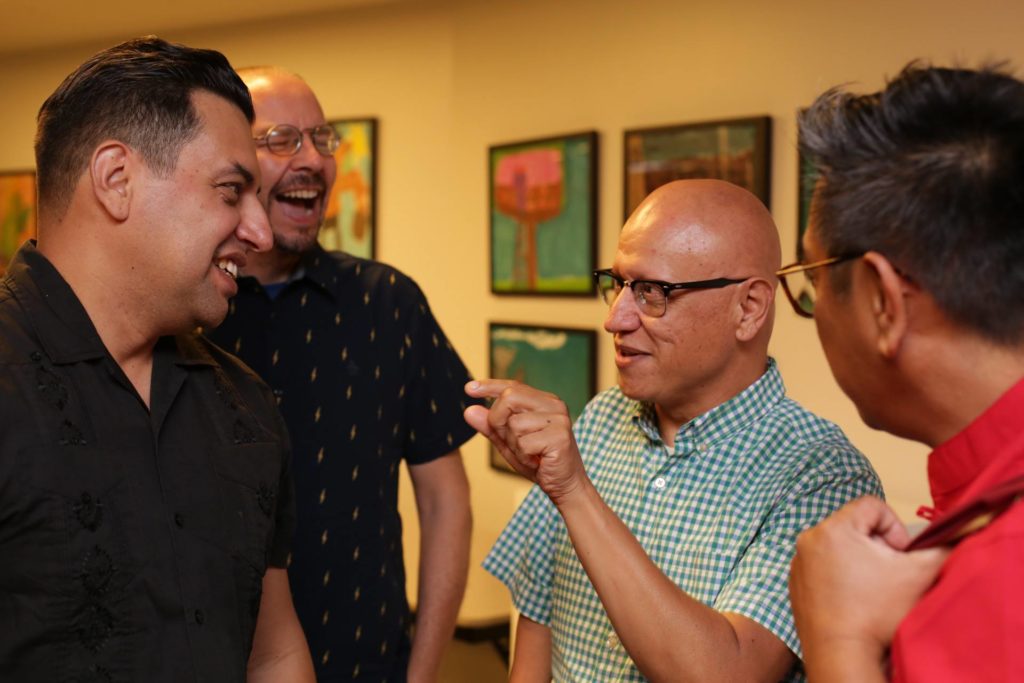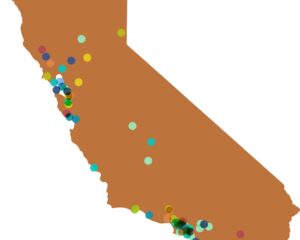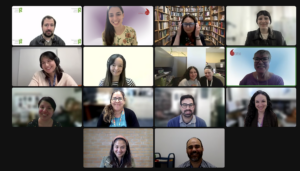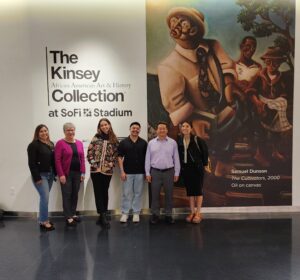At the end of March, 12 California Humanities board and staff members gathered in Sacramento for our first ever Advocacy Day with state officials. Throughout the day and 40 meetings with elected officials or their staff, we explained who we are, what we do, and how the people of California will be further enriched by a direct investment from the state budget in the humanities. Our conversations were rich with knowledge and data about our grant lines, initiatives, and the wonderful grantees that we have funded. We also shared how the humanities stories that connect us to each other are essential foundations to our work.
One such story was shared by our Board Vice-Chair, Alex Espinoza, at the evening reception. The following is the speech that he shared that evening:
There was never an empty corner in the house where I grew up. Space was always an issue in our three-bedroom house in suburban Los Angeles. I was the youngest of 11 children, 13 if you include the two sisters who died in Mexico before I was born. Add the extended family, and you can imagine what it was like: people coming or going at all hours – siblings, relatives, friends of my brothers and sisters, friends of friends of my brothers and sisters. Home wasn’t a sanctuary, wasn’t a safe haven from the crime and poverty, the daily assaults and dramas. My siblings were strong willed and brash. I was no saint, either, and I could tell you stories, but that’s for another talk. Yet I was nothing at all like any other member of my family, in part because I couldn’t be. Growing up poor and Mexican is one thing, but growing up poor, Mexican, disabled, and gay was something else entirely. I was taught never, ever to question, to never ask. I was left alone a lot, and I learned how to recede into the background, to lay quiet and watch. I had no room of my own. My bedroom was the living room couch, and most nights, I fell asleep to the sounds of either arguing or television, sometimes both.
There was a picture on the living room wall: a rustic house overlooking a courtyard with a fountain. Some nights, after everyone had gone to bed and I was able to enjoy the solitude and silence, I would stare at the picture, lit up by the streetlights outside. If I watched long enough, I could see the water moving, the trees rustling in the wind, and I could imagine the lives being led behind the windows of that house, could envision ghosts and wolves and life and adventure in the forests just beyond the picture’s edge.
I was an unfocused teenager, and I almost dropped out of high school. I wasn’t the worst of students, but I wasn’t the best, either. I enjoyed writing and reading, but that wasn’t the prescribed course for a Mexican boy at La Puente High School. Years later, I’d come across a quote by writer James Baldwin that would perfectly capture the angst and fear and confusion that often chased me around the streets and back alleys of La Puente. Asked by a British interviewer, “When you were starting out as a writer you were black, impoverished, homosexual. You had to have said to yourself, ‘Gee, how disadvantaged can I get?’ ” Baldwin replied: “Oh no, I thought I hit the jackpot — it was so outrageous, you could not go any further. So you had to find a way to use it.” I had to find a way to use all of this. Back then, though, I simply didn’t have the power to figure out how.
I would have been lost were it not for books and stories, for works of literature and writing that opened windows into other possibilities, other worlds. Poe. Shakespeare. Dickinson. Dickens. They were my salvation. It was in a community college classroom that first encountered Chicanx writers. Suddenly, instead of reading about Romans in togas stabbing one another or jilted Victorian brides, I was reading about experiences that mirrored my own, about people, like my brothers and sisters and their friends, like my parents, like me, breathing on the page, their lives and experiences validated through literature. And here were writers named not Shakespeare and Poe and Dickinson and Dickens, but Soto and Garcia and Cisneros and Rodriguez. Here, suddenly, was an alternate canon, unlike that which, throughout much of high school, had ignored us.
I’ve been giving a lot of thought to the place of the humanities in our current national discourse, about why stories and histories matter. We need stories. We need the humanities. I think about Virginia Woolf, how, in her essay “A Room of One’s Own,” she imagines a woman named “Judith,” sister to William Shakespeare, a woman just as talented as her brother, but who was not allowed to pursue her abilities because of the social constraints of the time. A woman, Woolf explains, needs a space and financial stability to create art; she needs a room of her own.
And my mind turns to Tomás Shakespeare and his sister Esperanza. I think how the Chicanx, Latinx, the queer, the undocumented, and the disabled artist, student, and scholar too need their room, their space to allow for the formation of individual and original thought. This is why the humanities matter. This is why I have given so much of myself to advocate and champion for programs like these. Because the humanities turned a shy, awkward, timid kid into the person you see here today.
Story is in our DNA. Story is how we struggle to find our place in the world, how we struggle to hold on to the legacies of the past as we charge forever forward. We are forever “cradled in one culture, sandwiched between two,” Gloria Anzaldúa explained, “straddling all three cultures and their value systems, [we undergo] a struggle of flesh, a struggle of borders, an inner war.” From this place, this “thin strip of barbed wire,” we create art.
How beautiful is that?
I see the stories we tell, all of them out there drifting up and out like ribbons of smoke, seeping out across our state and our continent. Over the sea. Across the Sierras. Forever drifting over this sliver of land we stand on that is always moving and shifting. I see the stories we tell. I hear the voices we tell them with swirling and swirling around and around us all. I ask you to close your eyes. To reach out, to capture them like I’ve been so lucky to have done. Hold these stories close to you and, together, let us gather them as one.
Copyright Alex Espinoza.





